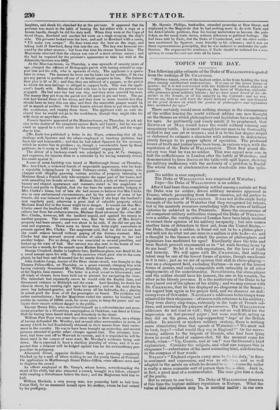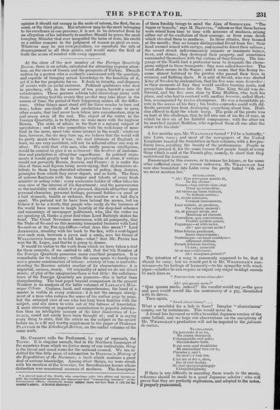TOPICS OF THE DAY.
" Military talent, even of the highest order, is far from holding the first place among intellectual endowments. It is one of the lower forms of genius : for it is not conversant with the highest and richest objects of
thought.' The conqueror of Napoleon, the hero of Waterloo, undoubt- edly possesses great military talents ; but we hare never heard of his elo- quence in the Senate, or of his sagacity in the Cabinet ; and we ven- ture to say, that he will leare the world without adding one new thought on the great thentes on which the genius of philosophers and legislators have meditated for ages."
There certainly would seem nothing strange in the circumstance
of the soldier leaving the world without adding one new thought on the themes on which philosophers and legislators have meditated for ages. As pertinently and wisely might it be prophesied, that BENTHAM or MILL would leave the world without winning one sanguinary battle. It is merit enough for one man to be thoroughly skilled in anyone art or science ; and it is to the last degree stupid or dishonest to estimate a character with reference to deficiencies utterly foreign to its proper sphere of operation. The professed
lovers of truth and justice' i have been busy, n various ways, with the
reputation of the Duke of WELLINGTON. Their first grand dis- covery was that he was no soldier. This was agreed nent. con. in half the coffeehouses in London after the battle of Waterloo ; and demonstrated by lines drawn on the table with spilt liquor, showing his military inefficiency with the certainty of a problem in Euclid The whole form of condemnation was resolvable into this syllo- gism—
No soldier is ever surprised;
The Duke of WELLINGTON was surprised at Waterloo ; Ergo—the Duke of WELLINGTON is no soldier.
After it had been thus completely settled among a certain set that
the Duke was no soldier, divers military memoirs appeared in France, which, proceeding from former enemies, yet did justice to the military genius of WELLINGTON. It was not in the single lucky triumph of the battle of Waterloo that they recognized his talents, but in the masterly resources concluding with the series of brilliant victories he achieved in the Peninsula. Since the concurrence of all competent military authorities stamped the Duke of WELLING- TON a soldier, the worthy critics of London have been lately inclined to retract their opinion of his military incapacity ; but now comes another form of detraction to their aid, from the United States,—.- the Duke, though a soldier, is found out not to be a philosopher ; and will not do what not one man in a million is able to do—i.e. add a thought to the themes on which the genius of philosophers and legislators has meditated for ages! Excellently does the trite and terse Scotch proverb recommend us to "let each herring hang by its am n head:' So let it be with reputations, for the love of truth and honesty. We will agree with Dr. CHANNING, that military talent may be one of the lowest forms of genius, though excellence in it is rare ; just as we are of opinion that skill in chess-playing- war on a. chequered field, excluding Fortune—is one of the lowest forms of genius, and really compatible with imbecility in all other employments of the understanding. Nevertheless, the chess-player and the soldier should have his honour, the one in his wooden, the other in his bloody province. It is the misfortune of the Duke to be now placed out of the sphere of his ability ; and we may concur with Dr. CHANNING, that he has displayed no eloquence in the Senate ; but regard him again in his proper field, and we discover no defi- ciency even of this order. NAPOLEON'S addresses to his troops vere admired for their eloquence— of course with reference to his auditory. They were showy clap-traps, extremely to the taste of French sol- diers, and answering the purpose of persuasion. The WELLINGTON addresses do not read so well ; they are not so well fitted for the impression on hot-pressed paper ; but were excellent, acting as they did on the gross, red, cap-supporting "lugs" of the British soldier. In ancient or modern military oratory, there is nothing more stimulating than that speech at Waterloo—" We must not be beat, boys !—what would they say in England ?" Or the nerves bracing address to the brigade of Guards, who had been lying down to avoid a flood of cannon-shot, till the moment came for attack, when—" Up, Guards, and at 'em !" was the General's brief explanation. Consider the subjects, and what can surpass this in eloquence ?—exhortation of the most animating kind, and direction, in the compass of four words. NELSON'S "England expects every man to do his duty," is finer in sentiment and expression, and was as e, and as well adapted to the minds on which he desired to ati l'eeause the sailor is really a more romantic sort of person than tile s,Idier. Jack is, in fact, a good deal of a sentimentalist. The seas give him a dash of the poetic. But to return to our text. The Duke of WELLINGTON deserves at this time the highest military reputation in Europe. What the value of that reputatiou may be, IS another matter; in our own
opinion it should not occupy in the scale of esteem, the first, the se- cond, or the third place. But whatever may be the merit belonging to his excellence in one province, it is not to be detracted from by an allegation of his inferiority in another. Should he prove the most bungling Minister that ever misguided the helm of state, his credit as a soldier remains in the judgment of reason as great as ever. Whatever may be our own prejudices, we repudiate the arts of disparagement in all their guises, and would make the field of truth the arena of combat with every opponent.



















 Previous page
Previous page